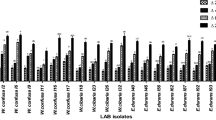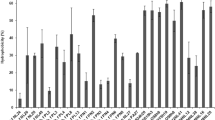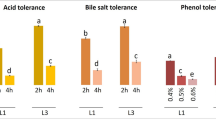Abstract
The promotion of human health through natural approaches like functional foods and probiotics is in high demand. The medicinal plants are the major feed of Moroccan dromedary, which improves the functional properties of their milk. A few studies have reported the probiotic and functional aptitudes of lactic acid bacteria (LAB) of this milk. In this context, our study aimed to identify LAB isolated from Moroccan raw camel milk and investigate their probiotic features and their fermentation profile. The molecular identification of twelve isolates indicated that they belong to Pediococcus pentosaceus, Enterococcus faecium, and Enterococcus durans. All LAB strains displayed high tolerance to gastrointestinal conditions (survival rate of 31.85–96.52% in pH 2.5, 35.23–99.05% in 0.3 bile salts, and 26.9–90.96% in pepsin), strong attachment abilities (auto-aggregation and hydrophobicity ranged from 28.75 to 95.9% and from 80.47 to 96.37%, respectively), and high co-aggregation ability with pathogenic bacteria. Importantly, they did not present antibiotic resistance or hemolytic activity. Our LAB strains demonstrated antimicrobial activity against Staphylococcus aureus, Pseudomonas aeruginosa, Escherichia coli, Bacillus subtilis, and Salmonella enterica. Moreover, they could acidify cow milk (ΔpH of 2.55 after 24 h) and improve its antioxidant ability (inhibition of 36.77% of DPPH). Based on the multivariate analysis, Pediococcus pentosaceus Pd24, Pd29, Pd38, Enterococcus faecium Ef18, and Enterococcus durans Ed22 were selected as the most promising probiotics. Therefore, we propose that Pediococcus pentosaceus isolated from camel milk could be used as potential probiotic strains and/or starter cultures in functional milk fermentation.





Similar content being viewed by others
Data Availability
The datasets generated during and/or analysed during the currenet study are available from the corresponding author on reasonable request.
References
Abushelaibi A, Al-Mahadin S, El-Tarabily K, Shah NP, Ayyash M (2017) Characterization of potential probiotic lactic acid bacteria isolated from camel milk. LWT 79:316–325. https://doi.org/10.1016/j.lwt.2017.01.041
Ahmed S, Ashraf F, Tariq M, Zaidi A (2021) Aggrandizement of fermented cucumber through the action of autochthonous probiotic cum starter strains of Lactiplantibacillus plantarum and Pediococcus pentosaceus. Ann Microbiol 71:1–33. https://doi.org/10.1186/s13213-021-01645-5
Alaoui Ismaili M, Saidi B, Zahar M, Hamama A, Ezzaier R (2016) Composition and microbial quality of raw camel milk produced in Morocco. J Saudi Soc Agric Sci 18:17–21. https://doi.org/10.1016/j.jssas.2016.12.001
Alp G, Aslim B (2010) Relationship between the resistance to bile salts and low pH with exopolysaccharide EPS production of Bifidobacterium spp. isolated from infants feces and breast milk. Anaerobe 162:101–105. https://doi.org/10.1016/j.anaerobe.2009.06.006
Ayyash M, Abushelaibi A, Al-Mahadin S, Enan M, El-Tarabily K, Shah N (2018) In-vitro investigation into probiotic characterisation of Streptococcus and Enterococcus isolated from camel milk. LWT 87:478–487. https://doi.org/10.1016/j.lwt.2017.09.019
Balakrishnan G, Agrawal R (2014) Antioxidant activity and fatty acid profile of fermented milk prepared by Pediococcus pentosaceus. J Food Sci Technol 51:4138–4142. https://doi.org/10.1007/s13197-012-0891-9
Bayili GR, Johansen PG, Hougaard AB, Diawara B, Ouedraogo GA, Jespersen L, Sawadogo-Lingani H (2020) Technological properties of indigenous Lactococcus lactis strains isolated from Lait caillé, a spontaneous fermented milk from Burkina Faso. J Dairy Res 87:110–116. https://doi.org/10.1017/S0022029919000888
Bekri S, Desriac F, Barreau M, Clamens T, Gallavardin T, Nahenec-Martel PL, Vieillard J, Datoussaid Y, Choukchou-Braham N, Lesouhaitier O, Franck X, Leleu S (2020) New antibacterial cadiolide analogues active against antibiotic-resistant strains. Bioorg Med Chem Lett 30:127580. https://doi.org/10.1016/j.bmcl.2020.127580
Bhukya KK, Bhukya B (2021) Unraveling the probiotic efficiency of bacterium Pediococcus pentosaceus OBK05 isolated from buttermilk: an in vitro study for cholesterol assimilation potential and antibiotic resistance status. PLoS ONE 16:e0259702. https://doi.org/10.1371/journal.pone.0259702
Bindu A, Lakshmidevi N (2021) Identification and in vitro evaluation of probiotic attributes of lactic acid bacteria isolated from fermented food sources. Arch Microbiol 203:579–595. https://doi.org/10.1007/s00203-020-02037-0
Bourdillon AT, Edwards HA (2021) Review of probiotic use in otolaryngology. Am J Otolaryngol 42:102883. https://doi.org/10.1016/j.amjoto.2020.102883
Cao Z, Pan H, Tong H, Gu D, Li S, Xu Y, Ge C, Lin Q (2016) In vitro evaluation of probiotic potential of Pediococcus pentosaceus L1 isolated from paocai—A Chinese fermented vegetable. Ann Microbiol 66:963–971. https://doi.org/10.1007/s13213-015-1182-2
Chen T, Wang L, Li Q, Long Y, Lin Y, Yin J, Zeng Y, Huang L, Yao T, Abbasi MN, Yang H, Wang Q, Tang C, Khan TA, Liu Q, Yin J, Tu Q, Yin Y (2020) Functional probiotics of lactic acid bacteria from Hu sheep milk. BMC Microbiol 20:228. https://doi.org/10.1186/s12866-020-01920-6
CLSI (Clinical and Laboratory Standards Institute) (2017) Performance standards for antimicrobial susceptibility testing: twenty sixth informational supplement, M100–S26. Curr Opin Food Sci 32:17–28. https://doi.org/10.1016/j.cofs.2020.01.003
Daba GM, El-Dien AN, Saleh SAA, Elkhateeb WA, Awad G, Nomiyama T, Yamashiro K, Zendo T (2021) Evaluation of Enterococcus strains newly isolated from Egyptian sources for bacteriocin production and probiotic potential. Biocatal Agric Biotechnol 35:102058. https://doi.org/10.1016/j.bcab.2021.102058
Davati N, Yazdi FT, Zibaee S, Shahidi F, Edalatian MR (2015) Study of lactic acid bacteria community from raw milk of iranian one humped camel and evaluation of their probiotic properties. Jundishapur J Microbiol 8:1–6. https://doi.org/10.5812/jjm.8(5)2015.16750
Derdak R, Quinteiro J, Sakoui S, Addoum B, Rodríguez Castro J, Rey Méndez M, Soukri A, El Khalfi B (2021) Isolation and identification of dominant bacteria from raw donkey milk produced in a region of morocco by qiime 2 and evaluation of their antibacterial activity. Sci World J 2021:1–7. https://doi.org/10.1155/2021/6664636
Dubey V, Mishra AK, Ghosh AR (2020) Cell adherence efficacy of probiotic Pediococcus pentosaceus GS4 MTCC 12683 and demonstrable role of its surface layer protein Slp. J Proteomics 226:103894. https://doi.org/10.1016/j.jprot.2020.103894
El Hatmi H, Jrad Z, Oussaief O, Nasri W, Sbissi I, Khorchani T, Canabady-Rochelle LLS (2018) Fermentation of dromedary camel Camelus dromedarius milk by Enterococcus faecium, Streptococcus macedonicus as a potential alternative of fermented cow milk. LWT 90:373–380. https://doi.org/10.1016/j.lwt.2017.12.040
Fernandes ML, Perin LM, Todorov SD, Nero LA, Alencar ER, Ferreira MDA (2018) In vitro evaluation of the safety and probiotic and technological potential of Pediococcus pentosaceus isolated from sheep milk. Semin Cienc Agrar 39:113. https://doi.org/10.5433/1679-0359.2018v39n1p113
Granato D, Barba FJ, BursaćKovačević D, Lorenzo JM, Cruz AG, Putnik P (2020) Functional foods: product development, technological trends, efficacy testing, and safety. Annu Rev Food Sci Technol 11:93–118. https://doi.org/10.1146/annurev-food-032519-051708
Gupta S, Mohanty U, Majumdar RK (2021) Isolation and characterization of lactic acid bacteria from traditional fermented fish product Shidal of India with reference to their probiotic potential. LWT 146:111641. https://doi.org/10.1016/j.lwt.2021.111641
Hao L, Cheng Y, Su W, Wang C, Lu Z, Jin M, Wang F, Wang Y (2021) Pediococcus pentosaceus ZJUAF-4 relieves oxidative stress and restores the gut microbiota in diquat-induced intestinal injury. Appl Microbiol Biotechnol 105:1657–1668. https://doi.org/10.1007/s00253-021-11111-6
Hu D, Wu J, Jin L, Yuan L, Li J, Chen X, Yao J (2021) Evaluation of Pediococcus pentosaceus strains as probiotic adjunct cultures for soybean milk post-fermentation. Food Res Int 148:110570. https://doi.org/10.1016/j.foodres.2021.110570
Huang J, Zhang W, Hu Z, Liu Z, Du T, Dai Y, Xiong T (2020) Isolation, characterization and selection of potential probiotic lactic acid bacteria from feces of wild boar, native pig and commercial pig. Livest Sci 237:104036. https://doi.org/10.1016/j.livsci.2020.104036
Jitpakdee J, Kantachote D, Kanzaki H, Nitoda T (2021) Selected probiotic lactic acid bacteria isolated from fermented foods for functional milk production: lower cholesterol with more beneficial compounds. LWT 135:110061. https://doi.org/10.1016/j.lwt.2020.110061
Kadri Z, Spitaels F, Cnockaert M, Amar M, Joossens M, Vandamme P (2021) The bacterial diversity of raw Moroccon camel milk. Int J Food Microbiol 341:109050. https://doi.org/10.1016/j.ijfoodmicro.2021.109050
Khedid K, Faid M, Mokhtari A, Soulaymani A, Zinedine A (2009) Characterization of lactic acid bacteria isolated from the one humped camel milk produced in Morocco. Microbiol Res 164:81–91. https://doi.org/10.1016/j.micres.2006.10.008
Li Y, Liu T, Zhao M, Zhong H, Luo W, Feng F (2019) In vitro and in vivo investigations of probiotic properties of lactic acid bacteria isolated from Chinese traditional sourdough. Appl Microbiol Biotecnol 103:1893–1903. https://doi.org/10.1007/s00253-018-9554-8
Mahmoudi I, Moussa OB, Khaldi TEM, Kebouchi M, Soligot C, Le Roux Y, Hassouna M (2016) Functional in vitro screening of Lactobacillus strains isolated from Tunisian camel raw milk toward their selection as probiotic. Small Rumin Res 137:91–98. https://doi.org/10.1016/j.smallrumres.2016.03.016
Mallappa RH, Singh DK, Rokana N, Pradhan D, Batish VK, Grover S (2019) Screening and selection of probiotic Lactobacillus strains of Indian gut origin based on assessment of desired probiotic attributes combined with principal component and heatmap analysis. LWT 105:272–281. https://doi.org/10.1016/j.lwt.2019.02.002
Margalho LP, Jorge GP, Noleto DAP, Silva CE, Abreu JS, Piran MVF, Brocchi M, Sant’Ana AS (2021) Biopreservation and probiotic potential of a large set of lactic acid bacteria isolated from Brazilian artisanal cheeses: From screening to in product approach. Microbiol. Res. 242:126622. https://doi.org/10.1016/j.micres.2020.126622
Meng Z, Zhang L, Xin L, Lin K, Yi H, Han X (2018) Technological characterization of Lactobacillus in semihard artisanal goat cheeses from different Mediterranean areas for potential use as nonstarter lactic acid bacteria. J Dairy Sci 101:2887–2896. https://doi.org/10.3168/jds.2017-14003
Mercha I, Lakram N, Kabbour MR, Bouksaim M, Zkhiri F, El Maadoudi EH (2020) Probiotic and technological features of Enterococcus and Weissella isolates from camel milk characterised by an Argane feeding regimen. Arch Microbiol 202:2207–2219. https://doi.org/10.1007/s00203-020-01944-6
Motey GA, Owusu-Kwarteng J, Obiri-Danso K, Ofori LA, Ellis WO, Jespersen L (2021) In vitro properties of potential probiotic lactic acid bacteria originating from Ghanaian indigenous fermented milk products. World J Microbiol Biotechnol 37:37–52. https://doi.org/10.1007/s11274-021-03013-6
Moussaid S, Bouhlal O, Benali A, Kabbour MR, Ounine K, El Maadoudi EH (2021) Technological characterization of indigenous lactic acid bacteria from Moroccan camel milk for their potential use as starter or adjunct culture. Folia Microbiol (praha) 66:761–774. https://doi.org/10.1007/s12223-021-00885-x
Novik G, Savich V (2020) Beneficial microbiota. Probiotics and pharmaceutical products in functional nutrition and medicine. Microbes Infect 22:8–18. https://doi.org/10.1016/j.micinf.2019.06.004
Oh A, Daliri EBM, Oh DH (2018) Screening for potential probiotic bacteria from Korean fermented soybean paste: in vitro and Caenorhabditis elegans model testing. LWT 88:132–138. https://doi.org/10.1016/j.lwt.2017.10.007
Osmanagaoglu O, Kiran F, Ataoglu H (2010) Evaluation of in vitro probiotic potential of Pediococcus pentosaceus OZF isolated from human breast milk. Probiotics Antimicrob Proteins 2:162–174. https://doi.org/10.1007/s12602-010-9050-7
Oussaief O, Jrad Z, Sbissi I, Nasri W, Khorchani T, El-Hatmi H (2020) Technological and probiotic potential of autochthonous lactic acid bacteria from spontaneously fermented dromedary milk. J Food Process Preserv 44:e14685. https://doi.org/10.1111/jfpp.14685
Pinto CLO, Souza LV, Meloni VAS, Batista CS, Silva R, Martins EMF, Cruz AG, Martins ML (2018) Microbiological quality of Brazilian UHT milk: identification and spoilage potential of spore-forming bacteria. Int J Dairy Technol 70:20–26. https://doi.org/10.1111/1471-0307.12339
Rahmeh R, Akbar A, Kishk M, Al-Onaizi T, Al-Azmi A, Al-Shatti A, Shajan A, Al-Mutairi S, Akbar B (2019) Distribution and antimicrobial activity of lactic acid bacteria from raw camel milk. New Microbes New Infect 30:100560. https://doi.org/10.1016/j.nmni.2019.100560
Reuben RC, Roy PC, Sarkar SL, Alam RU, Jahid IK (2019) Isolation, characterization, and assessment of lactic acid bacteria toward their selection as poultry probiotics. BMC Microbiol 19:253. https://doi.org/10.1186/s12866-019-1626-0
Rezaei M, Noori N, Shariatifar N, Gandomi H, Akhondzadeh Basti A, Mousavi Khaneghah A (2020) Isolation of lactic acid probiotic strains from Iranian camel milk: technological and antioxidant properties. LWT 132:109823. https://doi.org/10.1016/j.lwt.2020.109823
Ribeiro SC, Coelho MC, Silva CCG (2021) A rapid screening method to evaluate acidifying activity by lactic acid bacteria. J Microbiol Methods 185:106227. https://doi.org/10.1016/j.mimet.2021.106227
Roobab U, Batool Z, Manzoor MF, Shabbir MA, Khan MR, Aadil RM (2020) Sources, formulations, advanced delivery and health benefits of probiotics. Curr Opinion Food Sci. https://doi.org/10.1016/j.cofs.2020.01.003
Sharma A, Lavania M, Singh R, Lal B (2021) Identification and probiotic potential of lactic acid bacteria from camel milk. Saudi J Biol Sci 28:1622–1632. https://doi.org/10.1016/j.sjbs.2020.11.062
Singla V, Mandal S, Sharma P, Anand S, Tomar SK (2018) Antibiotic susceptibility profile of Pediococcus spp. From diverse sources. 3 Biotech 8:477–489. https://doi.org/10.1007/s13205-018-1514-6
Song YR, Lee CM, Lee SH, Baik SH (2021) Evaluation of probiotic properties of Pediococcus acidilactici M76 producing functional exopolysaccharides and its lactic acid fermentation of black raspberry extract. Microorganisms 9:1364. https://doi.org/10.3390/microorganisms9071364
Tang C, Kong L, Shan M, Lu Z, Lu Y (2021) Protective and ameliorating effects of probiotics against diet-induced obesity: a review. Food Res Int 147:110490. https://doi.org/10.1016/j.foodres.2021.110490
Todorov SD, Dioso CM, Liong MT, Nero LA, Khosravi-Darani K, Ivanova IV (2023) Beneficial features of pediococcus: From starter cultures and inhibitory activities to probiotic benefits. World J Microbiol Biotechnol 39:1–20. https://doi.org/10.1007/s11274-022-03419-w
Topçu KC, Kaya M, Kaban G (2020) Probiotic properties of lactic acid bacteria strains isolated from pastırma. LWT 134:110216. https://doi.org/10.1016/j.lwt.2020.110216
Unban K, Chaichana W, Baipong S, Abdullahi AD, Kanpiengjai A, Shetty K, Khanongnuch C (2021) Probiotic and antioxidant properties of lactic acid bacteria isolated from indigenous fermented tea leaves miang of north thailand and promising application in synbiotic formulation. Fermentation 7:179–195. https://doi.org/10.3390/fermentation7030195
Vijayalakshmi S, Adeyemi DE, Choi IY, Sultan G, Madar IH, Park MK (2020) Comprehensive in silico analysis of lactic acid bacteria for the selection of desirable probiotics. LWT 130:109617. https://doi.org/10.1016/j.lwt.2020.109617
Widodo I, Nurliyani S, Wahyuni E, Taufiq TT (2016) Isolation and identification of goat milk-derived Lactobacillus paracasei M104 and Pediococcus pentosaceus M103 and their potential use as starter culture for fermentation. J Microbiol Biotechnol Food Sci 5:374–377. https://doi.org/10.15414/jmbfs.2016.5.5.374-377
Yang H, He M, Wu C (2021) Cross protection of lactic acid bacteria during environmental stresses: stress responses and underlying mechanisms. LWT 144:111203. https://doi.org/10.1016/j.lwt.2021.111203
Yasmin I, Saeed M, Khan WA, Khaliq A, Chughtai MFJ, Iqbal R, Tehseen S, Naz S, Liaqat A, Mehmood T, Ahsan S, Tanweer S (2020) In vitro probiotic potential and safety evaluation hemolytic, cytotoxic activity of bifidobacterium strains isolated from raw camel milk. Microorganisms 8:333–354. https://doi.org/10.3390/microorganisms8030354
Yin H, Ye P, Lei Q, Cheng Y, Yu H, Du J, Pan H, Cao Z (2020) In vitro probiotic properties of Pediococcus pentosaceus L1 and its effects on enterotoxigenic Escherichia coli-induced inflammatory responses in porcine intestinal epithelial cells. Microb Pathog 144:104163. https://doi.org/10.1016/j.micpath.2020.104163
Zaaraoui L, Ounine K, El Hamdani M, Benali A, Oukassou M, Bouksaim M (2016) Evaluation and selection of autochthonous lactic acid bacteria as starter cultures from goat’s raw milk. J Biotechnol Biochem 2:16–21
Acknowledgements
The authors thank Dr. Sara Ziraoui from the medical analysis laboratory of Souk Larbaa du Gharb, Kenitra, Morocco for her help in carrying out the test of LAB antibiotic sensitivity, and Dr. Soumia Ait Assou from the team of Microbial Biotechnology, Faculty of Sciences Dhar El Mahraz, Sidi Mohamed Ben Abdellah University, Fez, Morocco for its help in proofreading the article.
Funding
The authors declare that no funds, grants, or other supports were received during the preparation of this manuscript.
Author information
Authors and Affiliations
Contributions
Conceived or designed the study: SM, EHEM. Performed research: SM, MAEA, OB, AB. Analyzed data: SM, MAEA, OB, OK. Wrote the paper: MS, MAEA, KO, AB, OB, AR, HH, EHEM.
Corresponding author
Ethics declarations
Conflict of interest
The authors have no relevant financial or non-financial interests to disclose.
Additional information
Communicated by Yusuf Akhter.
Publisher's Note
Springer Nature remains neutral with regard to jurisdictional claims in published maps and institutional affiliations.
Rights and permissions
Springer Nature or its licensor (e.g. a society or other partner) holds exclusive rights to this article under a publishing agreement with the author(s) or other rightsholder(s); author self-archiving of the accepted manuscript version of this article is solely governed by the terms of such publishing agreement and applicable law.
About this article
Cite this article
Moussaid, S., El Alaoui, M.A., Ounine, K. et al. In-vitro evaluation of the probiotic potential and the fermentation profile of Pediococcus and Enterococcus strains isolated from Moroccan camel milk. Arch Microbiol 205, 144 (2023). https://doi.org/10.1007/s00203-023-03489-w
Received:
Revised:
Accepted:
Published:
DOI: https://doi.org/10.1007/s00203-023-03489-w




